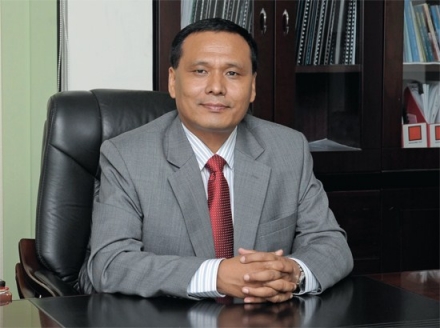Lower-income households and farmers to benefit from the tariff waiver. Energy minister says Nepal Electricity Authority and Department of Irrigation will bear the cost of tariff waiver.

The government announced a tariff waiver for lower income groups and irrigation facilities on the same day Kul Man Ghising returned to the Nepal Electricity Authority as managing director.
Ghising is credited with ending the problem of hours-long daily power outages in the country during his previous stint as chief of the authority.
Energy Minister Pampha Bhusal said on Wednesday that the authority’s board, which she chairs, decided to provide electricity free of charge for the people who use less than 20 units a month.
“But, a service charge of Rs30 should be paid,” she told a press meet after Ghising's appointment.
Earlier, the ministry had instructed the authority to make necessary arrangements for tariff waiver.
Bhusal said that the cost of tariff waiver would be Rs700-750 million.
“The authority will itself bear this cost as a corporate social responsibility,” she said.
Based on this decision, the Electricity Regulatory Commission is expected to make price adjustments soon.
“The decision will be implemented within one month,” Bhusal said.
Once implemented, around 2.1 million consumers will benefit from the scheme, according to the authority.
It means, around 42 percent of the authority’s customers will not be required to pay any tariff except Rs30 as service charge. As of mid-April, the power utility body has over five million customers.
Currently, the government has been providing free electricity to the people whose monthly power consumption is up to 10 units in line with the budgetary provision of the fiscal year 2020-21. Their number is around 1.3 million, according to the authority.
The authority’s decision has come at a time when the authority is set to lose around Rs4 billion due to various concessions given to individuals and businesses hit by the pandemic.
The authority’s board also decided to waive full tariff on the electricity used for running shallow tube wells.
According to Minister Bhusal, 80 percent of tariff will be waived during the peak hours while no tariff will be charged during other times. The decision is expected to help small farmers and irrigation facilities by benefiting 388,000 households.
Up to 80 percent power tariff will be exempted for farmers running deep tube wells as well as those irrigating farmlands with surface water with lift technology, according to the authority’s board.
According to Minister Bhusal, as much as 50 percent tariff will be exempted during the peak hours while farmers will get tariff waiver of 80 percent on other occasions.
This measure is expected to benefit 75,000 households who use deep tube wells to irrigate their farmlands.
All the fines will be waived for deep tube well users who had failed to pay electricity charge in the past if they operate the deep tube well and irrigate their farmlands, according to the board’s decision.
According to Bhusal, the decision will be implemented by the Department of Irrigation. She did not say when.
The cost for tariff waiver will be borne by the department itself by reimbursing the electricity utility body, according to Bhusal.
Bhusal said that the authority's board has also decided to make downward adjustment of tariff for households that use electric ovens.
In the last fiscal year 2020-21, the country imported liquified petroleum gas worth Rs36.15 billion, according to the Department of Customs. The government has been giving subsidies of Rs442 per cylinder of the cooking gas. With this subsidy, the government has provided a subsidy of around Rs10 billion in cooking gas, according to Bhusal.
The government also aims to promote the use of electricity in transportation services. The state owned power utility has already awarded a contract for developing 50 charging stations to promote electric vehicles.
“Tariff discounts will be given for charging electric vehicles, '' Minister Bhusal announced.
These measures have been taken in line with what Ghising had suggested in a recent interview with the Post.
Before his appointment as the chief of the authority, he had said in late July that electricity consumption could be increased in the areas of cooking, heating, and cooling by lowering prices.
“We can promote the use of electric ovens in our kitchen. There is also a lot of scope for boosting industrial demand by increasing the capacity of substations and reducing night-time prices of electricity to support irrigation projects,” Ghising had said.












